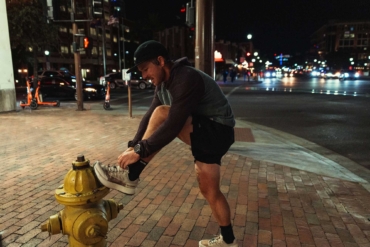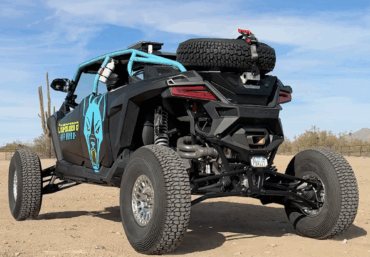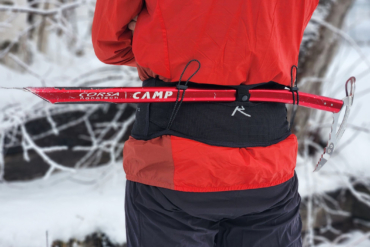Eric Spector ran his first 100-miler in 2018 — at age 71. This summer, he’ll attempt one of the hardest 100-milers in the country.
Come June, Eric Spector, 74, will be the second-oldest runner at Western States this year — and the oldest sponsored athlete (Spector is sponsored by Nathan). We dropped him a line to learn what it’s like to be an older runner in the ultraendurance race space. And, of course, to pick his brain on training methods and gear.
Coincidentally, Spector’s the same age as the pioneer who started it all: Western States’ founder Gordy Ainsleigh who’s run — and finished — the 100-miler 23 times over the years.
Recently, Denis Trafecanty, 78, was added to the entrant list through the Western States raffle. So for the first time in history, Western States will have three septuagenarians at the starting line.
If Spector or Trafecanty finish, they will also be the oldest finishers in Western States history.
Eric Spector’s Bio
- Hometown: Palo Alto, California
- Age: 74
- Favorite place to run: Black Mountain
- Hardest race finish: Rio Del Lago 100 Miler
Originally from the East Coast, Spector cut his teeth on road running and New York City marathons. But trail running is his true love. This year, he’s following that love for the trails to the start line of the Western States 100 Endurance Run.
Q&A With Eric Spector

GearJunkie: Is this your first time running Western States?
Spector: Yes, it’s my first time. I’ve run as a pacer for 2 years at Western States, and I run with a bunch of guys who’ve run in it. I’ve run in three qualifiers and qualified last year.
But, of course, because of COVID that didn’t happen. With COVID, it’s now been 6 years since my [Western States] journey began.
Why Western States?
I’ve volunteered at Western States, manning an aid station at the Rucky Chucky at the [American River] crossing. I’ve paced for the race. I’ve been around Western for a while. Knowing the course helps dramatically.
It’s an awesome race. It’s kind of like the Boston Marathon in a way, just in terms of getting in and qualifying, and then running a difficult course. Western’s like that, but in the ultra world. I’ve run it twice, Boston, and it’s community.
What are you most looking forward to?
Last year was a dark time for everyone, not racing. You know, the uncertainty. And now, we have some light at the end of the tunnel. It was disappointing to not have the chance to run.
I’m excited, optimistic, and doing a lot of things I should’ve done in the past [to train], like core strengthening. Once your mechanics start falling apart, everything just gets worse.
What are your top training tips for older runners?
Prevent injury. Avoiding injury is a critical piece. If something’s not right, you’ve got to listen to your body. With any injury, you are taking a step backward; but older runners, you are taking a longer step backward. Self-monitoring is important, being cautious. Give yourself more recovery intervals in training.
Give yourself time to plan. Running a 100-mile course requires a plan. You have to have a good understanding of what you need: nutrition, hydration, considering the weather. You can have hail and snow at the beginning of the race, and in the same day have 110 degrees in the canyons. It’s unpredictable.
What are your top training tips for beginner ultrarunners?
Set realistic expectations. You’ll be more successful if you lower expectations; do it gradually. Build up your distances gradually. Same with [starting to run] ultras — start with more experience on trails. Take your time. What only matters at first is that you get there. And enjoy the journey.
Educate yourself. Do some reading, learn about hydration, especially as the distances get longer.
Make a routine. Do whatever works for you, but stick to a routine. And keep a journal. Write what you did — time, miles — just to give yourself a sense of your own progress.
Where do you train?

I’m very fortunate to live in the Bay Area. It’s mountainous. There are two places close to where I live where I like to train: Black Mountain has some extraordinary trails. I can get 5,000 feet in elevation if I’m doing loops. It’s got both steep and gradual gradients — it’s a good workout.
Another place I go is Portola Valley’s Windy Hill Preserve and Open Space, which has steep, wooded trails. I go out (with my mask at the ready) and just run.
The third place I train is the course itself. We’ll go up early, driving to somewhere on the course, and [I’ll run for] 4-5 hours. I’ve done seven of those trips already.
Western States is 41,000 feet of elevation gain and loss, so it’s a challenge.
At what age did you start running competitively?
I’ve been running for 47 years. But, I didn’t get into ultrarunning until in my 60s, because it intrigued me. Western was not always in my focus, until a couple of years ago.
What noteworthy events have you run before this?
My first ultra race was a 50K — I was 60. When I was 65, I put together a schedule for myself of events for the year.
I did the Dipsea Race (which I’ve done every year), then the Double Dipsea, then a 50K, then an Olympic Tri, and then a 125-bike ride [the California Death Ride]. Then I did the Alcatraz Invitational, then a half [marathon], then an Ironman, and then I finished 65 off with a marathon.
I did 10 different events in 10 months. It was a little nuts.
What’s your best 100-miler time?
I’ve only done one 100. I think it was 29:15. I’ve done two 100Ks — there aren’t many 100Ks that are qualifiers for Western, but the ones that exist are difficult.
The Cuyamaca down in Arizona, and then Black Mountain in San Diego [were my] 100Ks. I mentioned I was talking to Gordy about [the Cuyamaca], and he was impressed, or whatever you call it, by my time at that race.
What’s the hardest race you’ve run before this?
The 100-mile race was a real challenge. Partly because it was 29 hours of nonstop [running], and when you’re running on a trail, you have to pay attention. It’s not like road running — you can’t look up at the scenery.
But my Ironman at 65, what can I say? I had to teach myself swimming in open water; that was tough, too.
What’s the hardest thing you’ve done before this?
I had just turned 20 when I committed to go into the Peace Corps. That was a good move for me. But hard. [It’s] a commitment to service, to a new culture, language.
We didn’t have phones back then; you couldn’t really call home. I served in Colombia — not an easy decision, but a good one.
In running, what gets harder with age?
I mentioned injury, which gets worse with age. In my mid-60s, I broke my leg and that shut me down for months. I was in a boot, and the doctors couldn’t figure out what was wrong. In the end, it was determined to be a fibula fracture.
And what gets better with age?
The good thing about muscles is at any point in life, you can strengthen them.
You know, I enjoy the long runs. When things go right … they are just magic. Some days I’m running 4, 5, 6 hours on a trail, and I don’t see another person. And that’s incredible in my 70s … to have the wilderness to myself.
Follow Eric Spector
And if Spector wasn’t cool enough, he’s also got a fairly robust Twitter page. “It’s about inspiring others, digging into the science, and encouraging people to start [getting fit] at pretty much any age. I just want to inspire people, to just get started,” he said.
You can follow him @FitAtAllAges for more tips, tricks, and running revelations.
Eric Spector’s Gear List
- Shoes: HOKA ONE ONE Stinson ATR 6
- Shirt: HOKA ONE ONE Fiesta Singlet
- Hat: Nathan Quick Stash Run Hat
- Socks: XOSKIN 5.0 XOToes Anklet
- Vest: Nathan VaporKrar 2.0 4-Liter Men’s Race Vest
- Fuel: Torq USA gels
This interview has been edited for readability and clarity.









